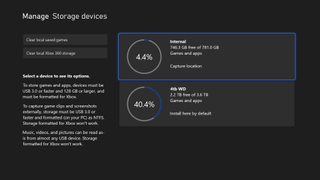Xbox Series X|S Supports USB 3.0 Drives 128GB and Greater
Extra storage with a catch

Microsoft's Xbox Series X and S consoles have specific requirements when it comes to using expandable storage. Titles that are optimized for Xbox Series X|S and Velocity Architecture can be stored on USB 3.0 drives but can only be played on the internal PCIe 4.0 NVMe SSD or the external Seagate SSD carts. Games that aren't optimized, such as Xbox One, Xbox 360, and original Xbox games, can be installed and played off of USB 3.0 external drives larger than 128GB.

It's worth pointing out that the 128GB requirement is lower than the 256GB minimum requirement that once was specified for the Xbox One and Xbox One X. This has changed with the updated Xbox UI, which is available on both the Xbox One and Xbox Series X|S consoles.
As for why Microsoft is not allowing games that are optimized for Xbox Series X|S to be played on USB 3.0 drives, there's a reason for that - speed. Both consoles exhibit enhanced loading times, enabling games to load much quicker than their current-gen counterparts. They also feature a game-changing feature called "Quick Resume," which allows gamers to play one game, then instantly switch to another in seconds.
While USB 3.0 external hard drives are fast, they're a far cry from speeds that have been noted for the Xbox Series X|S. Games that took minutes to load on the Xbox One now load half the time or less.
| Game | Xbox Series X | Xbox One X |
|---|---|---|
| Destiny 2 | 43 seconds | 1 minute, 53 seconds |
| Sea of Thieves | 20 seconds | 1 min, 20 seconds |
| No Man's Sky | 1 minute, 27 seconds | 2 minutes, 13 seconds |
| Assassin’s Creed Odyssey | 30 seconds | 1 minute, 7 seconds |
| Warframe | 25 seconds | 1 minute, 31 seconds |
| Final Fantasy XV | 13 seconds | 1 minute, 11 seconds |
| Red Dead Redemption 2 | 38 seconds | 2 minutes, 8 seconds |
Needless to say, this is why Microsoft wants everything to run off the internal SSD or external SSD carts.
The Xbox Series X|S next-generation consoles will launch on November 10th, 2020. The Xbox Series X is priced at $499 and includes a 1TB PCIe 4.0 NVMe SSD, while the Xbox Series S is priced at $299 and includes a 512GB PCIe 4.0 NVMe SSD.
Stay on the Cutting Edge
Join the experts who read Tom's Hardware for the inside track on enthusiast PC tech news — and have for over 25 years. We'll send breaking news and in-depth reviews of CPUs, GPUs, AI, maker hardware and more straight to your inbox.
Keith Mitchell is a Contributing Writer for Tom's Hardware US. He is an IT professional during the day, and a passionate lover of video games and tech after his 9-5 grind. He has a weird affinity for Soulsborne games and plays them non-stop.
-
hotaru.hino Even an SSD USB 3.0 drive should be plenty fast enough for XBSX optimizations for XB1 games if all the concern is about is storage performance. So I'm guessing the system is making a blanket assumption that all USB 3.0 storage drives are only as good as the XB1 internal drive.Reply
The loading time chart also seems kind of superfluous and doesn't really explain why USB 3.0 storage is insufficient. -
fball922 Reply
My best guess is that it is something with the Velocity Architecture and how DirectStorage communicates at a lower level with the SSD that isn't (yet?) possible over USB. There are other factors at play here too, such as the fact that the USB drive could be anything, where poor performance (from random IO or throughput perspective) would be a problem. SATA in particular would be a problem as it would limit throughput to ~450-500MBps, much much slower than NVMe/PCIe 4.0. Additionally, you introduce a SATA/M.2/PCIe to USB bridge chip that will further hurt performance.hotaru.hino said:Even an SSD USB 3.0 drive should be plenty fast enough for XBSX optimizations for XB1 games if all the concern is about is storage performance. So I'm guessing the system is making a blanket assumption that all USB 3.0 storage drives are only as good as the XB1 internal drive.
The loading time chart also seems kind of superfluous and doesn't really explain why USB 3.0 storage is insufficient. -
hotaru.hino Reply
I believe they only let you use external storage for XB1 games, which aren't designed around the Velocity Architecture. The only thing that would improve putting an XB1 game on an SSD meant for XBSX is just faster loading performance. If anything, it's likely a shortcoming of USB abstracting storage to the point where it just looks like a blob of storage.fball922 said:My best guess is that it is something with the Velocity Architecture and how DirectStorage communicates at a lower level with the SSD that isn't (yet?) possible over USB. There are other factors at play here too, such as the fact that the USB drive could be anything, where poor performance (from random IO or throughput perspective) would be a problem. SATA in particular would be a problem as it would limit throughput to ~450-500MBps, much much slower than NVMe/PCIe 4.0. Additionally, you introduce a SATA/M.2/PCIe to USB bridge chip that will further hurt performance. -
fball922 Reply
Yeah that's what I was getting at. The new games are designed to use DirectStorage, thus need to be on the internal drive. This guarantees to the developers that the DirectStorage API will work as expected, and guarantees the customer that they are getting the advertised speeds.hotaru.hino said:I believe they only let you use external storage for XB1 games, which aren't designed around the Velocity Architecture. The only thing that would improve putting an XB1 game on an SSD meant for XBSX is just faster loading performance. If anything, it's likely a shortcoming of USB abstracting storage to the point where it just looks like a blob of storage. -
samopa In the last paragraph :Reply
"The Xbox Series X|S next-generation consoles will launch on November 10th, 2020. The Xbox Series X is priced at $499 and includes a 1TB PCIe 4.0 NVME SSD, while the Xbox Series X is priced at $299 and includes a 512GB PCIe 4.0 NVME SSD."
So there will be 2 version of XBox Series X ? One that has 1 TB drive and the other only has 512TB drive ? -
keithdmitchell Replysamopa said:In the last paragraph :
"The Xbox Series X|S next-generation consoles will launch on November 10th, 2020. The Xbox Series X is priced at $499 and includes a 1TB PCIe 4.0 NVME SSD, while the Xbox Series X is priced at $299 and includes a 512GB PCIe 4.0 NVME SSD."
So there will be 2 version of XBox Series X ? One that has 1 TB drive and the other only has 512TB drive ?
No, there's just one version of each, that was a typo that was corrected. -
hotaru.hino Reply
I want a 512TB drive. Especially when they can get a PCIe 4 version cheap enough to live in a console.samopa said:So there will be 2 version of XBox Series X ? One that has 1 TB drive and the other only has 512TB drive ?
(Yes I know you meant GB :tonguewink:) -
I already have a 1tb Crucial p5 NVME in an usb enclosure on my series x and it is fantastic for last gen gamesReply
SAta 6 is enough to get max out of usb interface though.
Most Popular



